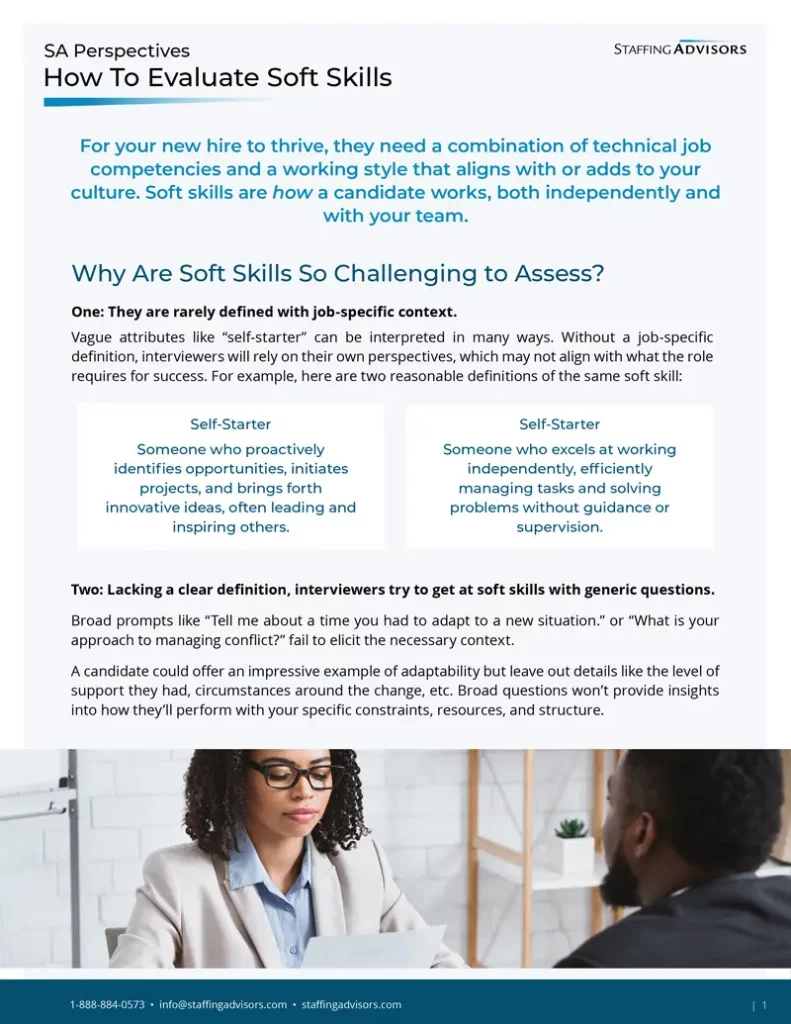Soft skills are typically challenging to evaluate, yet they are critical to how a candidate works independently and with your team. Job-relevant soft skills can make the difference between a great hire and a misfire. Outdated hiring practices rely on “gut feelings” and assumptions about what soft skills mean—at best, failing to yield good data to inform the hiring decision and, at worst, opening the door to bias. Here’s the framework we recommend to help clients accurately evaluate soft skills with a competency-driven approach.
Why Are Soft Skills So Challenging to Assess?
One: They are rarely defined with job-specific context.
Vague attributes like “self-starter” can be interpreted in many ways. Without a clear job-specific definition, interviewers will rely on their own perspectives, which may not align with what the role requires for success. For example, here are two reasonable definitions of the same soft skill:
Self-Starter: Someone who proactively identifies opportunities, initiates projects, and brings forth innovative ideas, often leading and inspiring others.
Self-Starter: Someone who excels at working independently, efficiently managing tasks, and solving problems without guidance or supervision.
Two: Lacking a clear definition, interviewers try to get at soft skills with generic questions.
Prompts like “Tell me about a time you had to adapt to a new situation.” or “What is your approach to managing conflict?” are too broad to elicit the necessary context.
A candidate could offer an impressive example of adaptability but leave out details like the level of support they had, circumstances around the change, etc. Broad questions won’t provide insights into how they’ll perform with your specific constraints, resources, and structure.
To Overcome These Challenges, Treat Soft Skills Like Any Job Competency
- Identify which soft skills are most essential to the role.
- Define them in relation to how your organization and teams work together.
- Prep every interviewer to evaluate candidates using the same criteria during structured interviews and work sample tests.
- Provide background information and context in the work sample assignment so you can more accurately assess how a candidate might work in your unique environment.
Identify: Consider the Layers of Context and Relationships
As you think through these prompts, consider your current state and future goals. Focus only on the most relevant soft skills and move other desired traits to your “nice to have” list.
- Your organization’s culture. Think about how you do the work collectively. How does your organization deal with change? Is your organization-wide communication style formal or informal? How are disagreements handled? What is your leadership style? What soft skills will the candidate need to work within these norms?
- Your team’s dynamics. Different teams within an organization require different soft skills to work together effectively. Your sales team will likely have a different way of working than your research team, which is probably different from your finance department. What soft skills are necessary for this person to perform at a high level working within the culture of your team?
- The requirements of the role. Think about what soft skills the individual will need to perform the function. Is this a largely independent role? Will the person be leading a team? Will they be interpreting large data sets? Will they be storytelling for your organization? Each functional area will require a unique set of soft skills.
Define: Create Examples to Debrief Interviewers
If you are going to weigh soft skills in the hiring decision, interviewers need a common understanding of what to look for. Debrief them on the soft skills required to succeed in the role and examples of what that looks like. This will help to clarify and reduce the tendency to evaluate by individual preferences (which can introduce bias).
Evaluate: Work Sample and Structured Interviews
The most accurate way to assess soft skills is during a real-world scenario like a work sample test.
A work sample assignment simulates your work environment—you and the candidate have a shared understanding of context. You can see how the candidate’s soft skills complement their technical job competencies in an actual work setting. Read more about work sample testing here.
When you create the assignment, give candidates resources and constraints similar to what they would encounter on the job. You may want to include which team members or stakeholders would be involved or impacted by the work along with other relevant resources like standard operating procedures, a sample portfolio of products, an org chart, membership surveys, sales analyses, etc.
We also recommend listening for clues about soft skills in candidates’ responses to competency-based structured interview questions. You’ll get a much richer perspective through the work sample, but as long as the required soft skills are well-defined, you should be able to listen for them when candidates talk about their competency in technical skill areas. Read more about the structured interview sequence we recommend here.
Don’t Just Think About Fit, Think About Add
Soft skills or working styles are closely tied to what many call “cultural fit.” But fit is an imperfect term. You may want a candidate who can fall in lockstep with your team, but consider the benefit of a contrasting working style that could challenge and energize your team and expand their capabilities.
Finally, we recommend giving candidates a bit of grace. Even when you provide context, you’ll have a much deeper understanding of how your organization and teams work than they do. It’s more helpful to consider whether they are directionally accurate than to seek perfect alignment.
Take It With You
Download a pdf of this article to share with your team (no email or signup required).
Want to learn how other competency-based hiring strategies can help you find and retain exceptional candidates who can drive impact in your nonprofit or association? Contact the Staffing Advisors team. We would love to talk with you.
Related Resources
- Read the Staffing Advisors Employer Guide to Interviewing for a complete guide through every step of the interview process—from pre-interview work and who to include in your interviews to determining what to discuss during structured interviews and how to collect feedback afterward.
- For a practical guide to developing effective work sample tests (including real examples from executive searches for Staffing Advisors’ nonprofit and association clients), read SA Perspectives: Work Sample Testing.

